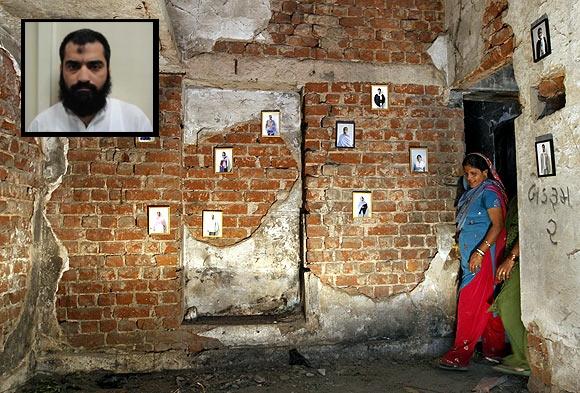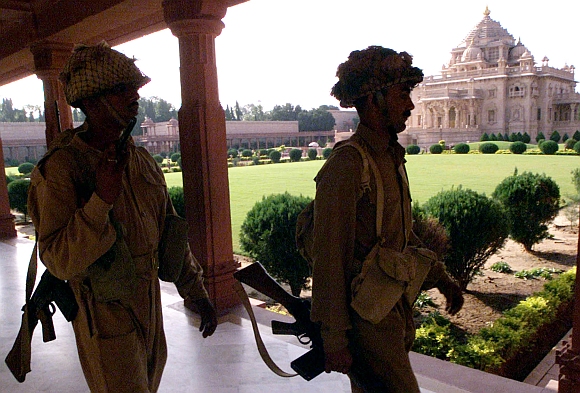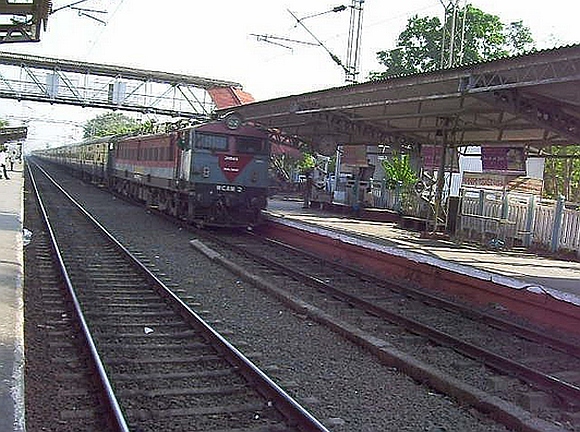 | « Back to article | Print this article |
I had planned to kill Narendra Modi in 2002: Jundal
This is what a defiant and talkative Abu Jundal, the Lashkar-e-Tayiba operative and key 26/11 handler who is in the custody of the Gujarat Anti-Terrorism Squad told his interrogators. Vicky Nanjappa reports.
Jundal's questioning by both the Delhi and Maharashtra police revolved largely round his role in the 26/11 attacks in Mumbai. Now, questioning by the Gujarat police, who have had him in their custody, more details about his activities in India have come to light.
Jundal, who hails from Beed in Maharashtra, has always held the 2002 Gujarat riots as one of the main reasons for him to take to terrorism, a fact recorded by an Intelligence Bureau dossier.
The questioning by the Gujarat police has now revealed that Jundal had a great deal of focus on the modules in Gujarat and was constantly working on building up a very strong network there. He focused largely on modules in Ahmedabad, and even while he was in Pakistan, his primary focus remained on this state.
Jundal had said during his questioning that it was easy to recruit people from Gujarat. There are a large number of youth who feel strongly about the riots. For the LeT, the 2002 riots worked like a charm when it came to recruiting new cadres, Jundal told his interrogators.
Jundal was attempting a deadly cocktail of the Lashkar and the Indian Mujahideen in Gujarat. After the 2006 Karnawati Express train blast, the police realised that the Gujarat module of the IM was extremely strong.
Click NEXT to read further...
'IM have at least 10 different plans regarding Gujarat'
However, there was a major crackdown on their modules which weakened them a great deal. But Jundal was aware of this and told the police that his job was to rebuild those outfits and have at least a 1,000-strong force for Gujarat alone.
"Our intention was to not to carry out blasts at regular intervals in the state. We wanted to create a module that was very strong, was not easily breakable. We wanted to carry out blasts which would create a great deal of impact," Jundal told his interrogators.
The Gujarat police also found that he had an important role to play in the 2006 blast. Jundal told the cops that it was a reminder of their power and they sought to send out a strong warning signal to the state administration which they believed was anti-Islam.
In addition, Jundal spoke about local contacts in Gujarat who continued to help with identifying youth and also handed out crucial logistical information. He told interrogators that the LeT and the IM have at least 10 different plans regarding Gujarat.
However, they are careful not to carry out a half-baked job since they have realised that the Gujarat administration is extremely serious about tackling the problem.
The Gujarat police however found Jundal to be defiant. "He didn't try to conceal any information and appeared to be proud of what he was doing. He sought to defeat the interrogators with his firm stance, and was found to be lecturing the cops on the importance of his operation," said an investigator.
Click NEXT to read further...
'The LeT never gave up on the IM '
Jundal told the cops that for the 2006 blast was a carefully planned operation. "Signs of setting up modules in the state commenced only in 2005," he told investigators.
"We watched, observed and decided to hit when the time was right. The first of the plans was to set up the homegrown outfit IM in Gujarat which comprised a set of very enthusiastic youth. We wanted persons who believed in an ideology because we felt they would be more dedicated workers. After the 2002 Akshardham Temple attack in Gandhinagar, there was a lot of focus on the LeT, and the Pakistan angle and we sought to reduce it by guiding the IM in the stat," he told the investigators.
"However, the LeT never gave up on the IM despite its modules being neutralised a great deal and at every meeting that we held in Pakistan, Gujarat was the main point discussion," he told investigators.
"Apart from blasts, we had also planned assassinations. A couple of Inter-Service Intelligence agents were sent into India to assassinate Gujarat Chief Minister Narendra Modi, but all those attempts failed. In fact, in 2002, when I inched closer to the Lashkar, I had begun setting up a plan to assassinate Modi," he told investigators.
"However we had to drop that plan as we realised it would create havoc if we succeeded. So we decided on slowly setting up cells and modules in the state and keep causing problems so that these incidents will have a lasting effect and the administration would be constantly reminded about our cause at all times," he said.
Click NEXT to read further...
'These groups will not stop concentrating on Gujarat '
Jundal also revealed that he had gone down to Saudi Arabia to oversee the IM's growth and he wanted to ensure that a proper channel was set up in order to oversee the Gujarat operations.
Officials from the state and the Central Intelligence Bureau, who are a part of these investigations say that Gujarat is an important state and there is need to keep digging into the activities of the Lashkar and the IM there.
"These groups will not stop concentrating on Gujarat and the police need to dig for more leads in order to break the modules. We have also realised that the Gujarat and Maharashtra modules are connected closely as they share resources and operatives," said an IB source.
"Jundal is aware of the logistics and speaks like a professional when it comes to these two states. He was only using his background in Maharashtra to link the modules with Gujarat," the source pointed out.
TOP photo features of the week
Click on MORE to see another set of PHOTO features...




